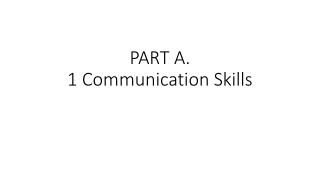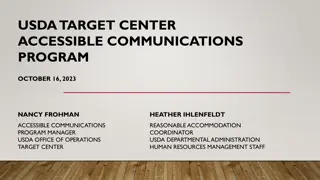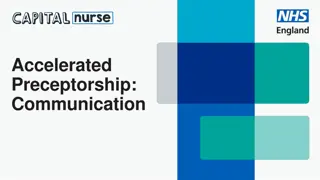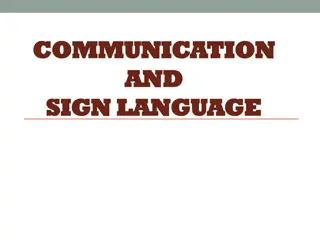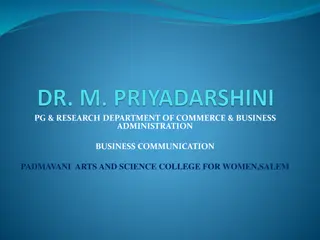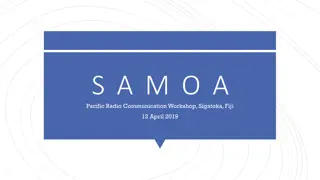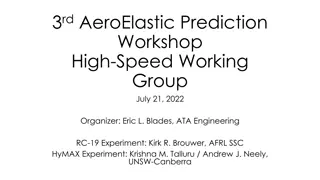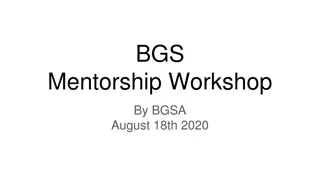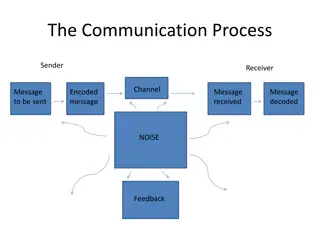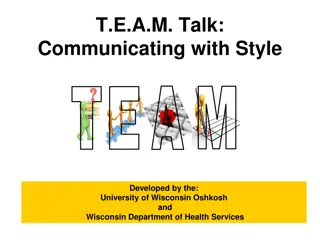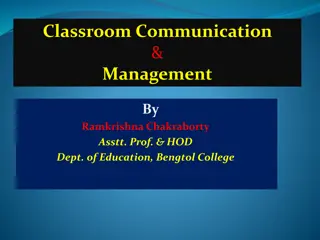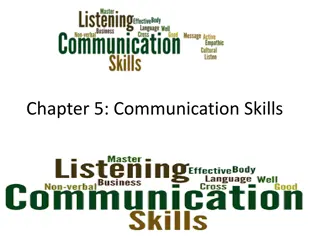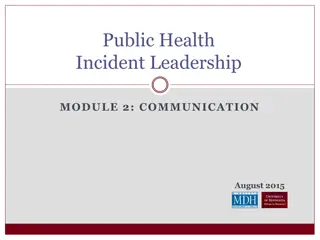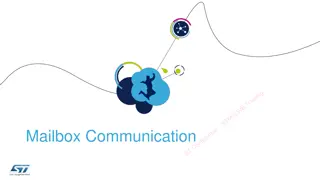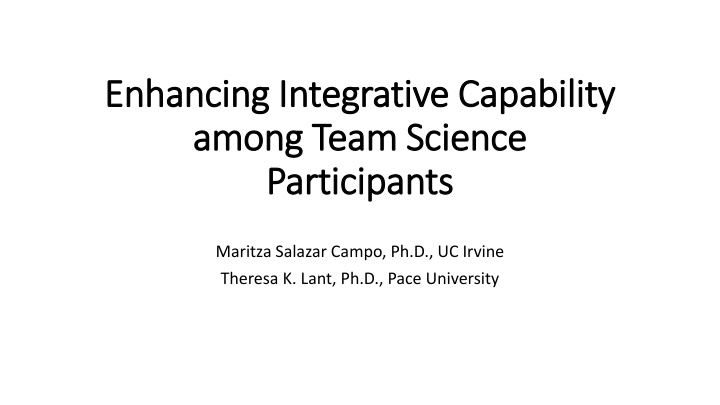
Enhancing Integrative Capability in Team Science Participants: Strategies and Impacts
Explore the strategies and impacts of enhancing integrative capability among team science participants, focusing on building team integrative capacity, socially integrative behaviors, and the role of team communication training in improving integrative capabilities. Dive into the assessment and improvement of interdisciplinary teams' integrative capacity to drive innovation.
Download Presentation

Please find below an Image/Link to download the presentation.
The content on the website is provided AS IS for your information and personal use only. It may not be sold, licensed, or shared on other websites without obtaining consent from the author. If you encounter any issues during the download, it is possible that the publisher has removed the file from their server.
You are allowed to download the files provided on this website for personal or commercial use, subject to the condition that they are used lawfully. All files are the property of their respective owners.
The content on the website is provided AS IS for your information and personal use only. It may not be sold, licensed, or shared on other websites without obtaining consent from the author.
E N D
Presentation Transcript
Enhancing Integrative Capability Enhancing Integrative Capability among Team Science among Team Science Participants Participants Maritza Salazar Campo, Ph.D., UC Irvine Theresa K. Lant, Ph.D., Pace University
BRIDGES: How do we assess and improve the Integrative Capacity of Interdisciplinary Teams to facilitate innovation?
Building Team Integrative Capacity by Fostering Member Building Team Integrative Capacity by Fostering Member Capabilities Capabilities Knowledge transformation & innovation Interdisciplinary Science Team Social integrative behaviors Cognitive integrative behaviors Emergent States lead to cognitive Integration Processes suggesting ideas connecting perspective seeking/Knowledge Consideration reflexivity Knowledge consideration Knowledge assimilation and accommodation Knowledge transformation 3
Integrative Capabilities: Socially Integrative Behaviors (SIBs) Integrative Capabilities: Socially Integrative Behaviors (SIBs) Subcomponent? ? Suggesting? ? Ideas? ? Reflexivity? Definition? ? Leaders? and? team? members? offer? suggestions? to? share? expertise? with? other? members.? ? Leaders? and? team? members? took? time? to? evaluate? the? methods? and? approaches? in? order? to? adjust? them? and? improve? functioning.? Leaders? and? team? members? are? connected? to? one? another? through? personal? introductions? or? referrals.? Leaders? and? team? members? actively? take? notice? of? and? process? the? implications? of? specific? knowledge? contributions? (e.g.,? a? proposed? fact)? offered? by? team? members? with? diverse? perspectives,? the? value? added? of? which? may? not? be? immediately? obvious.? Resources? ? Faraj? &? Sproull,? 2000;? Liang,? Fahr,? &? Fahr,? 2012? ? Schippers,? Den? Hartog,? &? Koopman,? 2007? Connecting? ? Others? Obsfeldt,? 2005? Knowledge? Consideration? Tjosvold,? Wedley,? &? Field,? 1986;? Drach-Zahavy? &? Somech,? 2001;? Sternberg? &? Wagner,? 1992;? Dalton? &? Cosier,? 1989;? Chen,? Tjosvold,? Zhao,? Ning,? &? Fu,? 2011;? Anderson? &? Martin,? 1995;? De? Dreu,? Koole,? &? Oldersma,? 1999;? Van? Der? Vegt? &? Bunderson,? 2005? ? NSF Award #1262754 BRIDGES
Can team communication training enhance team member Can team communication training enhance team member integrative capabilities? integrative capabilities? Quasi-experimental longitudinal study Teams randomly assigned Sample: Teams ranging from 2-6 people working on a joint project from 7 R1 institutions, Total N = 58 Pre-Post Measures: Social Integrative Behaviors Knowledge Consideration and Knowledge Accommodation Transdisciplinary Orientation Scale (Misra & Stokols & Cheng, 2015) Communication Principle Training Yes No 33 25
Evidence Evidence- -Based Team Based Team Communication Training Communication Training Drawing from qualitative analysis of over 120 hours of team science team meetings from 9 teams, we use vignettes and a simulation to teach the following four principles and their association with team innovation: Most Creative Team 4 5% Promotive Voice 9% Perspective Seeking 3 Different Discussions 23% Team Reflection 63% Promotive Voice Managing Connections Perspective Seeking 2 Less Creative Team Team Reflection Managing Connections 1 Promotive Voice 7% Perspective Seeking 16% 0 Team Reflection Time in Meeting 55% 22% Managing Connections
Team Team- -Focused Communication Training Focused Communication Training Training included team leader and as many members as could attend to help establish communication norms Use several real world vignettes demonstrating team leader communication using (and not using) the 4 principles Provide team communication development aids (e.g., worksheets, handouts) Promote the transfer of team training through the use of a team problem-solving simulation with an information integration task. Training Simulation: Identify the root cause and pathway for MRSA outbreak
Descriptive Statistics Table 2 Means, Standard Deviations, and Correlations 8 Variable M (SD) Min Max 1 2 3 4 5 6 7 .80 (.40) 0 1 1. Gender .20 2. Years of work in Area 7.89 (7.62) 0 40 4.74 (1.88) 1 7 -.01 .16 3. Highest Degree 4. Prior IDR participation 1.76 (.42) 1 2 .16 .13 .19 .11 (.79) -2.00 2.67 .13 -.12 -.12 .05 5. Suggesting .01 (.78) -1.75 2.00 -.12 .08 -.21 -.04 .02 6. Connecting -.06(.98) -2.40 2.40 .07 -.25 -.35* -.12 .03 .25 7. Reflection -.02(.61) -2.33 1.00 -.12 -.31 -.17 -.07 .09 .10 .16 8. Knowledge Consideration 9. Condition (0=control) .10 3.80 (.86) 0 2 .10 .12 -.24* .06 .21* -.03 .33* * p <.05, ** p <.01
Preliminary Preliminary Results of ANOVA: Results of ANOVA: Does communication training change social integrative behaviors? Comparison of Change T2-T1 0.3 0.25 0.2 0.15 0.1 0.05 0 -0.05 -0.1 -0.15 -0.2 -0.25 Suggest T2-T1* -0.07 0.25 Connect T2-T1 0.04 -0.08 Reflexivity T2-T1* -0.16 0.03 KC T2-T1* -0.19 0.11 Control Communication *P<.05 Covariates include Gender, Highest Degree, Years working in area, prior IDR experience
Conclusion Integrative capabilities can be enhanced through explicit efforts to enhance communication skills. Positive shifts were found post-training including an increase in suggesting ideas, reflection, and knowledge consideration. Longitudinal approach illustrates how training in intact teams supports a long-lasting effect of the training.
Future Directions Future Directions Knowledge transformation & innovation Interdisciplinary Science Team Finalize data collection and test mediating pathways and team performance Can integrative capacity enhance team effectiveness when members are geographically distributed or working across cultures? What other methodologies could be used to examine knowledge integration in teams (i.e. social networks, experiential sampling methodologies)?
Thank you! Thank you! Maritza.Salazar@uci.edu 12

